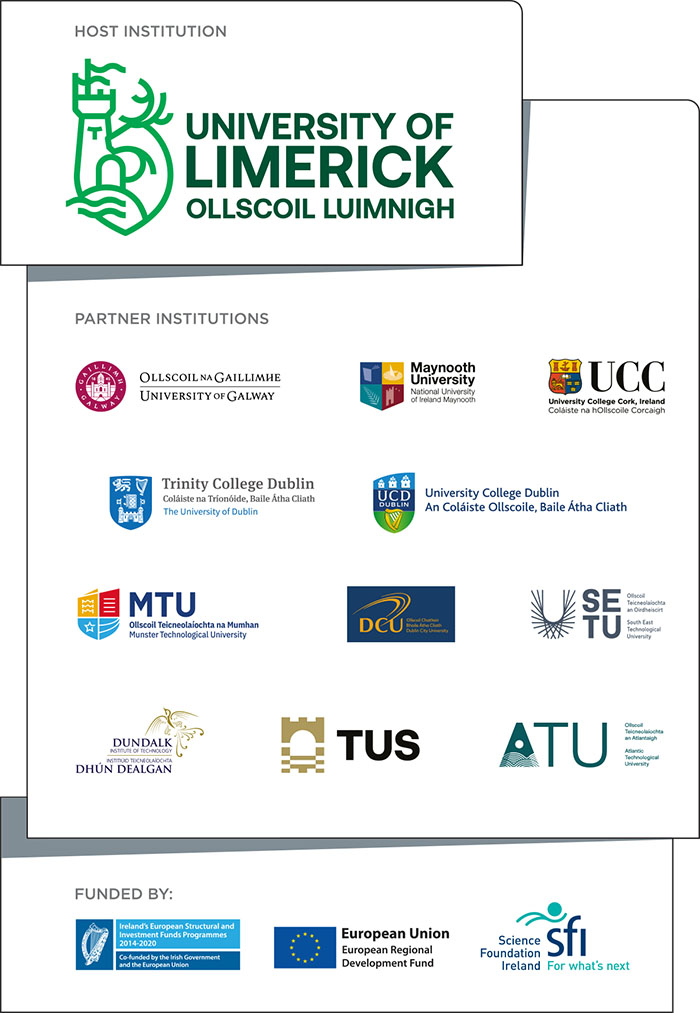Lero part of SFI STEAM Art Collaboration where artists and scientists join forces to inspire students
You are here
Science Foundation Ireland (SFI) have launched the STEAM Art Collaboration . This initiative aims to inspire and engage primary school students, and the public, with research through the commission of five artworks which unite the disciplines of art and science. Artists Shevaun Doherty, Ed Devane, 1iing Heaney, Peter Nash and David Beattie were chosen following a competitive selection process in 2020. The artists have worked in close collaboration with researchers from five SFI Research Centres including Lero at University of Limerick, to produce five artworks which creatively interpret an array of scientific topics. The artworks are informed by research on PCR testing, quantum communications, applied geosciences, Artificial Intelligence (AI) and neuroscience and are presented through a range of art mediums. Each of the five projects is specific and unique to the artist and researchers involved.
The project is funded under SFI’s Discover Primary Science and Maths programme, and in part by The Arts Council. Dr Ruth Freeman, Director of Science for Society, Science Foundation Ireland said: “This new collaboration through the SFI Discovery Primary Science and Maths Programme provides students with access to science in an engaging and educational environment, highlighting the many important connections between science and the arts. The five artists have interpreted their concepts in a variety of exciting ways which are informed by research, but are not purely explanatory in nature. The aim of the initiative is to captivate and inspire children to learn more and I would like to congratulate all those involved in creating these works of art.”
Cork artist Peter Nash is collaborating with Professor Martin Mullins of Lero and University of Limerick on a project focussing on some of the ethical challenges of driverless cars.
“This project examines the differences that arise when we consider a machine driving compared to a human driver. Decisions are made in a different way and yet these decisions can have moral consequences. For hundreds of years, with Emmanuel Kant as a key staging point, we humans were thought to have unique insights in the areas of morality. The challenge for future programmers is to allow cars to think ethically. It is not only a technical challenge but a philosophical one. All this is intimately related to the work of Peter Nash, ways of seeing - to borrow a phrase from John Berger – is a prerequisite for the “good car” and Peter’s work addresses the phenomena of how future cars will see the road and see all of us,” Professor Mullins said.
Using stop-motion animation, the artist has created an immersive physical world. Lero research has been interpreted into a narrative which depicts the journey of an autonomous vehicle around a familiar environment. The vehicle comes across different questions, challenges and situations along its way.
A virtual exhibition of all five artworks will take place for schools and the public to explore the collection and to delve into the stories behind each commission. In tandem with the exhibition, the collaboration between the SFI Research Centres, artists and the SFI Discover Primary Science and Maths programme will launch educational resources to enable primary school students to investigate the research topics further and to inspire attendees to create their own artworks informed by science, technology, engineering and maths.
The final works of art from all five centres (Lero, Future Neuro, APC Microbiome Ireland, Connect and iCrag) will be showcased for primary schools nationwide through two interactive virtual exhibitions taking place on Wednesday 12th May and Thursday 13th May 2021. To register for the event teachers can sign up via Eventbrite.
A public virtual exhibition will run from Thursday 20th May, with an evening launch taking place on this date from 7-9pm. Registration for this event will also be available on Eventbrite.
Following the exhibition all five art pieces, information on the projects, and their associated resources will be available on the SFI website.




